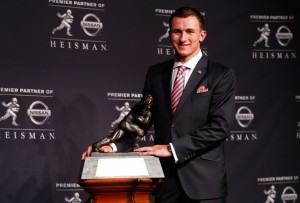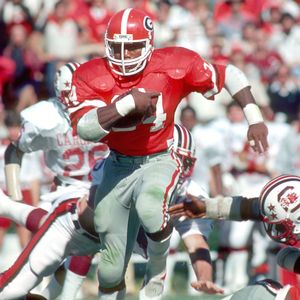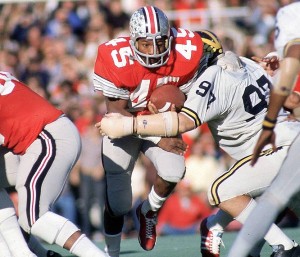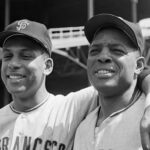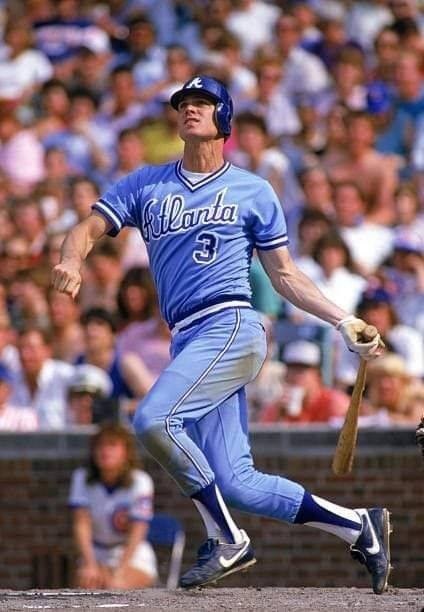2012 Heisman Trophy – Johnny Football Becomes Johnny Heisman
The selection of Texas A&M freshman quarterback Johnny Manziel as the 2012 Heisman Trophy winner showed us quite a lot about the evolution of college football.
Freshman Rising – Some may not realize that it was just 40 years ago when freshmen were first allowed to compete on varsity teams. Prior to that, all freshmen competed on what were then known as “freshmen teams” to get accustomed to college life and college athletics. They then had three years of varsity eligibility. Of course, once freshmen were given varsity eligibility in 1972 it started the trend of “redshirting” which has some of the same benefits of the old system in allowing the new student-athlete to get accustomed to college, but does not include the freshman team competition that utilized a year of eligibility. Johnny Manziel is a beneficiary of the redshirt program as he did not walk right off a high school campus this past spring and suddenly develop into the Heisman Trophy winner. Instead, he had a year of seasoning at Texas A&M before being thrust into the spotlight.
Still, that he was able to post such strong numbers playing in the toughest conference in college football as a freshman is a testament to his abilities and the ability of the new coaching staff that came to College Station this season to put him in immediate position to succeed.
Though the 20-year-old Manziel will go down as the first freshman to win the Trophy, I still don’t believe he is the best freshman football player of all-time. In 1980 Herschel Walker went directly from high school to leading the Georgia Bulldogs to an undefeated season and national title. The 18-year-old Walker set a freshman record with 1,616 yards while scoring 15 touchdowns to become the first “true” freshman to earn first team All-American honors.
In the 1980 Heisman voting, Walker finished third behind South Carolina senior George Rogers and Pittsburgh defensive lineman Hugh Green. Rogers out-gained Walker 1,781 to 1,616, but the Gamecocks finished the season with an 8-4 record. Green was the defensive leader of a Pittsburgh team that went 11-1 and finished ranked second in the country behind Georgia.
Walker went on to become the only player to finish in the top three in the Heisman voting for three straight years and won the trophy as a junior in 1982.
You also could definitely make a case for Adrian Peterson, who rushed for 1,925 yards and 15 touchdowns while finishing second to Matt Leinart for the award in 2004. Both the Trojans and Sooners were undefeated following the 2004 regular season, but Peterson had two big disadvantages compared to Leinart. One was that he was a freshman and the other was that he didn’t play quarterback.
Defense Wins Championships, But Not the Heisman– If there was ever going to be a year where a defensive player won the Heisman Trophy, it would have seemed like 2012 was that year. Generally, if the best player on the only undefeated team in the country is the starting quarterback, you can pretty much guarantee that player will win the Heisman Trophy.
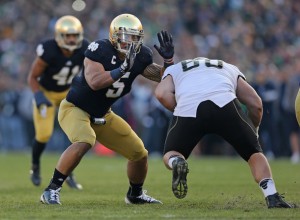
Manti Te’o was the first purely defensive player to finish second in the Heisman Trophy voting since Hugh Green in 1980.
Unfortunately, the same cannot be said if the best player lines up on defense. Manti Te’o has been a huge reason the Fighting Irish are playing for a National Championship, but since the Heisman Trophy was first awarded in 1935 only one defensive player, Charles Woodson in 1997, has won the award and he won primarily because he made some big plays pulling double-duty on offense late during their undefeated season.
Excluding Woodson’s selection in 1997, since Green finished second in the voting in 1980, six defensive players have finished in the top five in balloting for the Heisman, but none have ever finished higher than fourth in the voting.
Given those amazing numbers, it is quite impressive that Te’o was able to muster enough support to even finish second in 2012.
Winning Is Important, Except When It Isn’t – Every year we start with a dozen or so prominent Heisman Trophy candidates, but by the end of October many of those players have been eliminated because of a loss or two by their teams. However, it seems that not every loss is weighed equally. In 2011 Robert Griffin III and Andrew Luck had very similar statistical numbers. The one glaring difference was that Griffin’s Baylor team was 8-4 while Luck’s Stanford team finished the regular season 11-1. However, while Griffin was given a pass despite four losses, Luck’s Heisman chances were basically dismissed the minute the Cardinal lost to a highly ranked Oregon squad.
Similarly, this season, Manziel had mediocre performances in losses to LSU and Florida, but those were more than trumped by his masterful performance against top ranked Alabama. On the other hand Collin Klein of Kansas State was considered a Heisman front runner until the Kansas State defense gave up 52 points in a loss to Baylor. Though Klein passed for 286 yards and accounted for three total touchdowns in that game, his three picks in that contest, along with the bad performance by the defense, basically ended his chances of bringing home the trophy.
The Power of the SEC – Of course there is no way of knowing what might have happened had Texas A&M not moved from the Big 12 to the SEC this season, but it would seem that Manziel’s Heisman chances were definitely enhanced by the change in competition. Though the Heisman winner has come out of the Big 12 twice since 2008, the larger stage of the SEC seemed to help Manziel.
The SEC has been anointed as the top league in the country, so good performances in that conference are given higher stature and bad performances written off as to be expected given the level of competition from week to week.
Had his signature performance been against a top 10 or 15 team from Oklahoma, Kansas State or Texas, compared to against top ranked and defending champion Alabama, would it have received the same attention and had the same luster?
Manziel’s greatest advantage in the voting came in the Southeast and you wonder if the voters from that region may have championed another SEC candidate (South Carolina defensive end Jadeveon Clowney was next among SEC players in 6th place) if Texas A&M had not been in the conference.
So Is Manziel a Deserving Heisman Winner? – The short answer to this question is certainly yes. Statistically, he had an amazing season and helped lead Texas A&M to a 10-win season during their first year in the SEC. If the Heisman had a true history of going to the best football player in the country and not to the best offensive player from one of the marquee programs in the top power conferences, then it probably would have been harder to make a case for Manziel.
However, since the Heisman Trophy has spent more than seven decades narrowly defining college football greatness, then there really was no logical choice except the exciting freshman from Texas A&M.
What will be really interesting over the next couple years is to see if Manziel can join Archie Griffin as the only repeat Heisman winner or if his future accomplishments will start to get over-analyzed and down-graded if he doesn’t post the same eye-popping statistics or if the Aggies don’t take a step up over the next couple years.
Because, while Heisman voters are often quick to jump on the new big thing, they also can be very fickle and quick to knock you down a few pegs when someone else comes along to tickle their fancy.
